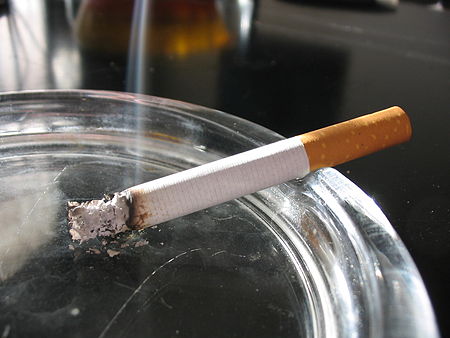
Last week, junior Jordyn Pair wrote a piece, “Stop smoking outside the library,” condemning smoking outside, between the Grewcock Student Union and Mossey Library, for all the wrong reasons. In doing so she speaks volumes about the way our generation responds to discomfort.
This summer in New York, I realized that a lot of people smoke. People from all walks and stations of life sit or stand in the crowded streets of Manhattan as they take in the beauty of the city and breathe out the blue smoke into the air for the rest of us.
I don’t mind the smell of cigarettes because it sure beats other city smells — hot garbage and exhaust. Even in Hillsdale, I’ve never been bothered with the group of people outside the library because they’ve always been there, just like it’s a given that people smoke in Manhattan.
But Pair and others are uncomfortable with the status quo. Last week Pair wrote, “It’s time to stop smoking in front of the library.” The problem is that both authors go about it the wrong way by using students’ comfort as a way to make statements about what other students should do without considering the consequences of their argument.
There are probably many of us that feel that smokers shouldn’t be allowed to bother our lungs and pollute our air. Many might be quick to take a moral or health-based highground that they think gives them the authority to tell smokers to leave for the sake of their own preferences.
Those who want the smokers to go away are guilty of a very easy, but harmful way of thinking that our generation is eager to embrace: many of us are quick to equate our preferences with moral claims. Essentially, if someone is impeding on our comfort, then they are an offense to our person and are morally wrong.
This mindset is prevalent enough that it deserves its own name, and maybe something like “preferential realism” could work for our purposes here.
Preferential realism is the notion that if enough people don’t like something, it shouldn’t be allowed to occur or exist simply because it is uncomfortable. We have such a ridiculous perception of ourselves in relation to reality that we think we are entitled to force our preferences on those around us and on reality.
We have applied preferential realism to everything: God, President Donald Trump, smoking, and speech that we disagree with.
There are those of us who convince themselves that there is no God simply because they are uncomfortable with a God who could send anyone to hell. Because of their own discomfort, many others try to cast God in their own image as a God who loves and forgives everyone instead of sending the unrepentant to hell. We are tempted to apply our preferences even to God.
As a more concrete example, I was at a creative storytelling event this summer in Brooklyn, and one of the anecdotalists said that after Trump’s victory, “Denial is survival,” and the room erupted in cheers of agreement.
I was shocked (and terrified someone might perhaps learn the truth about my political leanings and the mob that would follow), but I also realized that these poor people deny the latest election results daily because the uncomfort of the current situation is too offensive.
There is an increasing number of us who are uncomfortable with speech that we disagree with: Many colleges are succumbing to the intellectual anesthetic of safe spaces, free speech zones, and trigger warnings on offensive material.
Conservative students are often harassed by university and college administrators for handing out pocket Constitutions or displaying pro-life messages in public because many students feel threatened by the public exchange of ideas.
The great irony with Pair’s piece last week is that it ran underneath Liam Bredberg’s piece, “Safe spaces hinder college students.” His comments on our generation highlight the prevalence of preferential realism, especially in America’s colleges and universities.
“More and more college students whine about slight discomforts that are thrown their way. This generation tends to shy away from things that every adult has had to deal with at some point in their lives. Its weakness is disheartening,” Bredberg wrote.
Condemning smokers and calling for safe spaces are two sides of the same coin. In both cases, someone is trying to conform reality to their preferences.
If we push smokers away from the library because it makes us uncomfortable, we’re that much closer to pushing away our freedoms and the things that challenge us for the sake of our comfort — a mistake far more dangerous than secondhand smoke.
Brendan Clarey is a senior studying English.

